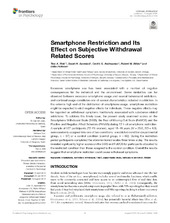| dc.contributor.author | Eide, Tine Almenning | en_US |
| dc.contributor.author | Aarestad, Sarah Helene | en_US |
| dc.contributor.author | Pallesen, Ståle | en_US |
| dc.contributor.author | Andreassen, Cecilie Schou | en_US |
| dc.contributor.author | Bilder, Robert M. | en_US |
| dc.date.accessioned | 2019-05-02T17:08:30Z | |
| dc.date.available | 2019-05-02T17:08:30Z | |
| dc.date.issued | 2018-08-13 | |
| dc.Published | Eide TA, Aarestad SH, Pallesen S, Andreassen CS, Bilder RM. Smartphone restriction and its effect on subjective withdrawal related scores. Frontiers in Psychology. 2018;9:1444 | eng |
| dc.identifier.issn | 1664-1078 | |
| dc.identifier.uri | https://hdl.handle.net/1956/19450 | |
| dc.description.abstract | Excessive smartphone use has been associated with a number of negative consequences for the individual and the environment. Some similarities can be observed between excessive smartphone usage and several behavioural addictions, and continual usage constitutes one of several characteristics included in addiction. In the extreme high end of the distribution of smartphone usage, smartphone restriction might be expected to elicit negative effects for individuals. These negative effects may be regarded as withdrawal symptoms traditionally associated with substance-related addictions. To address this timely issue, the present study examined scores on the Smartphone Withdrawal Scale (SWS), the Fear of Missing Out Scale (FoMOS) and the Positive and Negative Affect Schedule (PANAS) during 72 h of smartphone restriction. A sample of 127 participants (72.4% women), aged 18–48 years (M = 25.0, SD = 4.5), were randomly assigned into one of two conditions: a restricted condition (experimental group, n = 67) or a control condition (control group, n = 60). During the restriction period participants completed the aforementioned scales three times a day. The results revealed significantly higher scores on the SWS and FoMOS for participants allocated to the restricted condition than those assigned to the control condition. Overall the results suggest that smartphone restriction could cause withdrawal symptoms. | en_US |
| dc.language.iso | eng | eng |
| dc.publisher | Frontiers | eng |
| dc.rights | Attribution CC BY | eng |
| dc.rights.uri | http://creativecommons.org/licenses/by/4.0/ | eng |
| dc.subject | smartphone | eng |
| dc.subject | restriction | eng |
| dc.subject | withdrawal | eng |
| dc.subject | FoMO | eng |
| dc.subject | experimental study | eng |
| dc.subject | behavioural addiction | eng |
| dc.subject | PANAS | eng |
| dc.title | Smartphone restriction and its effect on subjective withdrawal related scores | en_US |
| dc.type | Peer reviewed | |
| dc.type | Journal article | |
| dc.date.updated | 2018-12-10T11:57:54Z | |
| dc.description.version | publishedVersion | en_US |
| dc.rights.holder | Copyright 2018 The Authors | |
| dc.source.articlenumber | 1444 | |
| dc.identifier.doi | https://doi.org/10.3389/fpsyg.2018.01444 | |
| dc.identifier.cristin | 1600273 | |
| dc.source.journal | Frontiers in Psychology | |
| dc.identifier.citation | Frontiers in Psychology. 2018, 9, 1444. | |
| dc.source.volume | 9 | |

